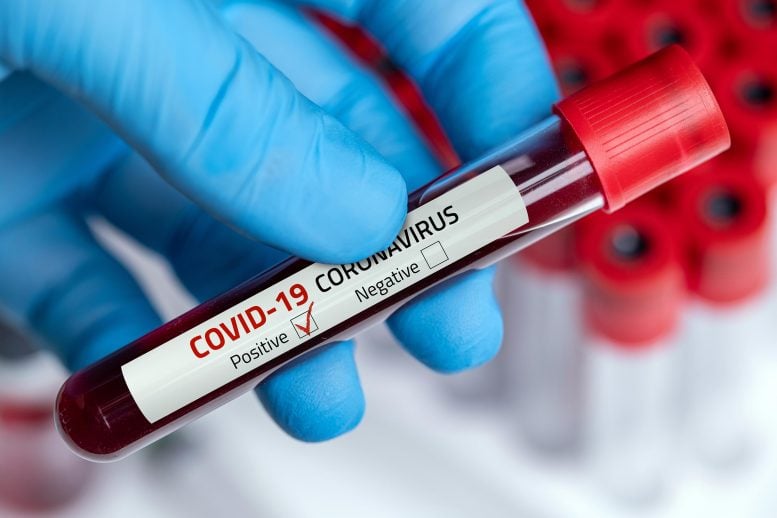
Researchers have outlined a two-step prognostic test designed to predict a patient’s response to SARS-CoV-2 infection.
As of April 2021, more than 3 million people worldwide have died of COVID-19. Early in the pandemic, researchers developed accurate diagnostic tests and identified health conditions that correlated with worse outcomes. However, a clinical predictor of who faces the highest risk of being hospitalized, put on a ventilator, or dying from the disease has remained largely out of reach.
This week in mSphere, an open-access journal of the American Society for Microbiology, researchers describe a two-step prognostic test that can help predict a patient’s response to infection with SARS-CoV-2. The test combines a disease risk factor score with a test for antibodies produced early in the infection. It could be administered at the time of diagnosis to help guide therapeutic choices before the most severe symptoms appear, the researchers said.
“You can predict with really high sensitivity that someone is going to have a severe case of COVID-19,” said Emily Sanders, a graduate student in the lab of chemical biologist Gregory Weiss, Ph.D, at the University of California, Irvine. Sanders led the study together with Sanjana Sen and Kristin Gabriel, also graduate students in Weiss’s lab.
Most diagnostic tests search for antibodies associated with interrupting the virus. Weiss said the group initially set out to develop their own diagnostic, following this same strategy, but quickly realized that plenty of competing tests would soon be available. Instead, they pivoted to focus on other, unstudied antibodies–ones that wouldn’t necessarily disrupt the virus or help the immune system fight the infection.
“Everyone else was looking for the good antibodies that neutralize the virus,” said Weiss, senior author on the study. “We weren’t seeing enough about antibodies that are unhelpful.”
“Being able to identify a ‘bad’ antibody response helps to fill in a research gap,” said Gabriel.
Previous studies have predicted that the SARS-CoV-2 particle has more than 55 epitopes, or sites on the virus where antibodies can attach. The best studied epitopes to date are those found on the S, or spike, protein, but the virus has three other structural proteins, each with epitopes worth investigating, said Sen. Using ELISAs, or enzyme-linked immunosorbent assays, the researchers compiled a list of antibodies that might correlate with worse prognosis and ultimately focused on one that attaches to epitope 9 on the N, or nucleocapsid, protein. The group also developed a tool that used data on factors including age, sex, and pre-existing health conditions to produce a disease risk factor score (DRFS).
They tested their tool on a group of 86 people who had tested positive for the coronavirus. Patients whose tests revealed the presence of epitope 9 antibodies were more likely to have prolonged illness and worse outcomes than people without the antibodies. Of the 23 people in the study who did have the antibodies associated with epitope 9, a high DRFS predicted disease severity with more than 92% sensitivity.
The test uses technology and tools readily available in testing labs, Weiss said. “Detecting antibodies is super easy to do,” he said, and an inexpensive prognostic test could inform treatment decisions early in the disease progression. The researchers found that the epitope-9 antibodies become detectable between 1 and 6 days after the onset of symptoms.
“We’ve all had friends and family impacted by this disease,” said Weiss, “and we wanted to do something that might be useful, that might help the physicians who are being overwhelmed.”
Reference: “Predicting COVID-19 Severity with a Specific Nucleocapsid Antibody plus Disease Risk Factor Score” by Sanjana R. Sen, Emily C. Sanders, Kristin N. Gabriel, Brian M. Miller, Hariny M. Isoda, Gabriela S. Salcedo, Jason E. Garrido, Rebekah P. Dyer, Rie Nakajima, Aarti Jain, Ana-Maria Caldaruse, Alicia M. Santos, Keertna Bhuvan, Delia F. Tifrea, Joni L. Ricks-Oddie, Philip L. Felgner, Robert A. Edwards, Sudipta Majumdar and Gregory A. Weiss, 28 April 2021, mSphere.
DOI: 10.1128/mSphere.00203-21









There is no evidence to support the claim in this article that three million people have died “of COVID 19” and you should be ashamed for spreading this myth. The facts show that many of the people on the official mortality lists died WITH covid, but not as a direct result of contracting the disease. Because of the change in WHO pandemic death reporting rules, anyone in countries like the UK and US who dies from ANY cause within 28 days of being pronounced positive in one of the extremely inaccurate PCR or lateral flow tests now in general use is put down as a COVID death, even if they were murdered or tossed themselves off a high building. You should change the name to something like Misinformation Daily or Pandemic Propaganda News.